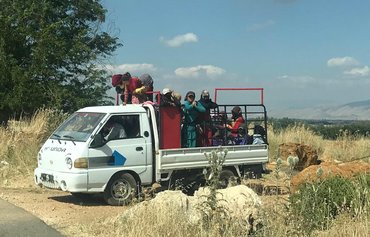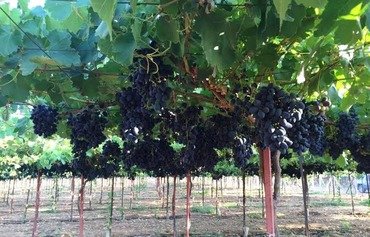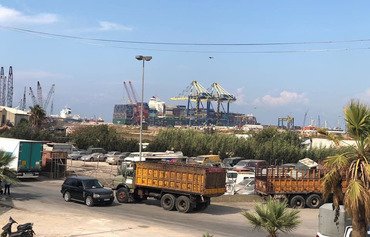Apple growers in Lebanon, once again blocked from selling their produce to regional markets due to the closure of land routes to Syria, sought to draw attention to their plight with an October 1st "day of rage".
Facing another year of catastrophic losses as the harvest season approaches, apple growers called for government subsidies and the establishment of alternative routes to external markets.
Their protests met with some success, with the government deciding at a Thursday (October 6th) meeting to pay 5,000 Lebanese pounds ($3.30) in compensation for every 20-kilogramme case of apples, directly to the growers.
The government also will provide a treasury loan of 40 billion Lebanese pounds ($26.5 million) that will be put at the disposal of the Higher Relief Commission, which supports Syrian refugees through the provision of food and services.
Additionally, the Lebanese army has been asked to conduct a survey of this season’s production, under the supervision of the Ministry of Agriculture and with the help of local authorities, and donor countries have been asked to buy 500,000 20-kilogramme cases in co-operation with the Ministry of Social Affairs, with proceeds to go to Syrian refugees in Lebanon and other countries.
Syria conflict blocks exports
Lebanon’s produce for the current season has reached approximately 160,000 tonnes, according to the Lebanese Ministry of Agriculture.
Despite private sector initiatives to support production by boosting purchase, "closing the Syrian border has hugely impacted sales", Minister of Agriculture Akram Shuhaib said on September 27th.
The main reason for low sales is "closure of the traditional land routes to Iraq, Jordan, Saudi Arabia and Egypt via Syria that are used to export produce", said Daoud al-Dhahir, chairman of the Farmers Co-operative for al-Aqoura in Jbeil.
Syria's war and the seizure of the routes used by Lebanese trucks by extremist groups such as the "Islamic State of Iraq and the Levant" (ISIL) have severely disrupted the export of apples and other produce, he told Al-Mashareq.
"Exporting by land via Syria had become a gamble with the start of the crisis and then it came to a complete halt two years ago with terrorist groups raiding truck drivers and kidnapping some of them," he said.
"Since then, we have been facing a mounting crisis year after year, and today we are facing a real catastrophe that has affected tens of thousands of growers who had been counting on selling their produce," he added.
In al-Aqoura, he said, 10,000 people live from the proceeds of apple sales year round, producing around 750,000 boxes, "with a similar amount produced in villages and towns in the Jbeil district, bringing the overall total to half a million boxes".
Calls to support apple growers
Land exports through Syria to Iraq, Jordan, Egypt and some Gulf countries previously accounted for about 75% of production, al-Dhahir said.
Maritime routes have been used in place of land routes, albeit at high prices that exceed farmers’ costs, he said, noting that a box of apples costs farmers 12,000 Lebanese pounds ($8) to produce, while buyers offer less than $5 per box.
At present, al-Dhahir said, there are "30,000 apple growers with nationwide production of up to 160,000 tonnes", no more than 14,000 tonnes of which are going for export.
"That is why we request that until the Syrian route is reopened, the Lebanese government should support farmers and provide alternative markets with subsidised transportation and export costs," he said.
Al-Dhahir also expressed his hope that international humanitarian organisations in Lebanon would procure some of the produce and deliver it to Syrian refugees.
In Batroun's Tannourine district, with produce reaching 300,000 boxes, thousands of growers are facing "poor sales", said Nehme Harb, an apple grower and former chairman of the farmer’s co-operative.
"Apple growers in all of Lebanon cannot sell their produce externally," he told Al-Mashareq. "In Tannourine, we used to be able to export 90% of our produce through Syria to a large number of Arab countries."
But with the closure of the Syrian border and the emergence of ISIL and Fatah al-Sham Front, formerly al-Nusra Front (ANF), at certain entry points, coupled with incidents with drivers, Lebanese exports have come to a near complete standstill, he said.
Growers are under pressure to sell their produce to the big buyers at very low prices and cannot recuperate their production costs per box, he said, adding that the temporary solution to this is state subsidisation of growers.
Syria crisis spillover
As with other produce, the apple export crisis "started with the events in Syria and got worse at the start of 2014", Minister of Economy and Trade Alain Hakim told Al-Mashareq.
"I had requested that the government open new markets for Lebanese produce with alternative export methods as part of a national strategy that would contribute towards strengthening the agricultural sector," he said.
More than 165 million boxes of apples, or 160,000 tonnes, have been lost due to the crisis, he said, and this has affected tens of thousands of apple growers.
In order to prevent a repeat of this situation, alternative solutions need to be put in place, he said, such as the use of apples in food manufacturing.
Adopting solutions like this, with the private sector as a key partner, would boost the manufacturing industry and provide new jobs, he added.
While the Lebanese economy has suffered significant losses in terms of exporting its agricultural produce by land due to the events in Syria, Hakim said, "we have to find rapid alternative solutions".

![Apples lie beneath the trees in Nabaa al-Safa in Mount Lebanon. Apple growers in Lebanon are struggling to sell their produce due to the closure of land routes to Syria. [Nohad Topalian/Al-Mashareq]](/cnmi_am/images/2016/10/07/6302-Lebanon-apple-produce-600_384.jpg)






